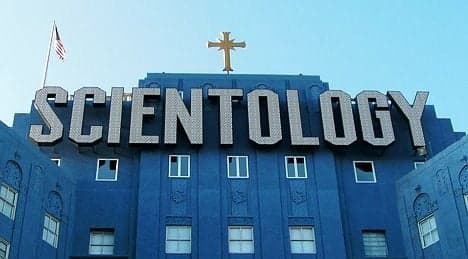Scientology fraud conviction upheld

A Paris appeal court on Thursday upheld a fraud conviction and a fine of hundreds of thousands of euros against the Church of Scientology for fleecing vulnerable followers.
The 2009 conviction saw Scientology's Celebrity Centre and its bookshop in Paris, the two branches of its French operations, ordered to pay €600,000 ($790,000) in fines for preying financially on several followers in the 1990s
The original ruling, while stopping short of banning the group from operating in France, dealt a blow to the secretive movement best known for its Hollywood followers such as Tom Cruise and John Travolta.
Alain Rosenberg, the leader of the movement in France, saw his two-year suspended jail sentence and €30,000 fine upheld. Sabine Jacquart, a former Celebrity Centre president, received the same fine and suspended sentence.
The court either upheld or increased fines -- now ranging between €10,000 and €30,000 -- against four more Scientologists.
Their convictions were for fraud or for the illegal practice of pharmacy, after plaintiffs said they were given vitamins and concoctions which the group claimed would improve their mental state.
"This is very good news for those who fight against cults and a serious defeat for the the Church of Scientology," said Olivier Morice, lawyer for Unadfi, a group that campaigns against sects and was a plaintiff in the case.
France regards Scientology as a cult, not a religion, and has prosecuted individual Scientologists before, but the 2009 trial marked the first time the organisation as a whole had been convicted.
Scientology's Paris Celebrity Centre said it would contest the latest ruling in France's highest appeals court, the Court of Cassation.
It denounced the judgement as "totally false and inequitable" and was "the result of a ghost trial which saw numerous irregularities and violations of the fundamental rights of the Scientologists."
About 250 Scientologists protested against the ruling outside the Paris courthouse, holding placards reading "I have the right to my religion" and chanting "No discrimination against Scientologists" as they beat on drums.
Church of Scientology lawyers in November raised five constitutional questions in a bid to get the trial annulled, but they were rejected, prompting the defendants and their lawyers to walk out.
Court hearings in the latest trial were curtailed because of the absence of the accused, while the four former followers who brought the case also withdrew from the trial.
The sole remaining witness was Catherine Picard, who heads Unadfi.
Picard testified to the "heavy debts, broken family ties" and the "state of subjection" that could result from the "sect-like methods" used by Scientology to "indoctrinate vulnerable people".
The original case followed a complaint by two women, one of whom said she was manipulated into handing over €20,000 in 1998 for Scientology products including an "electrometer" to measure mental energy.
A second claimed she was forced by her Scientologist employer to undergo testing and enrol in courses, also in 1998. When she refused she was fired.
Founded in 1954 by US science fiction writer L. Ron Hubbard, the Church of Scientology is recognised as a religion in the United States. It claims a worldwide membership of 12 million including 45,000 followers in France.
Join the conversation in our comments section below. Share your own views and experience and if you have a question or suggestion for our journalists then email us at [email protected].
Please keep comments civil, constructive and on topic – and make sure to read our terms of use before getting involved.
Please log in here to leave a comment.